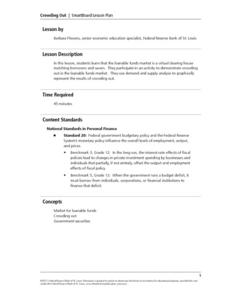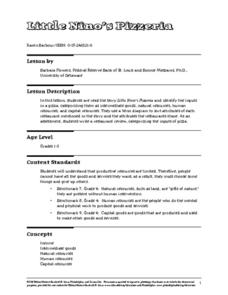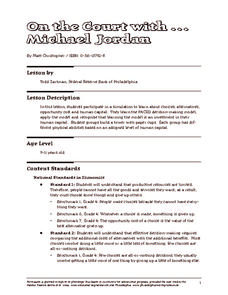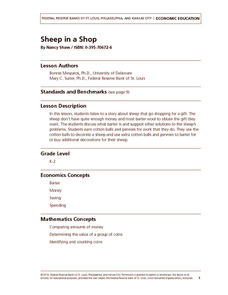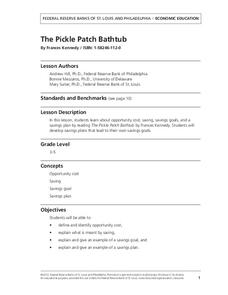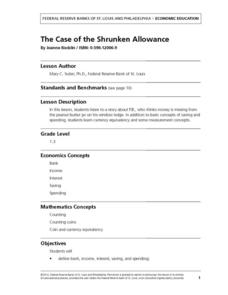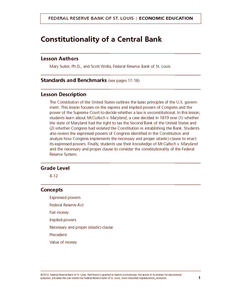Curated OER
2009 U.S. National Chemistry Olympiad National Exam - Part I
The 2009 version of the first part of a national chemistry competition is posted for your use with olympiad hopefuls. Test takers deal with 60 multiple choice questions covering an entire year of chemistry curriculum. Use this to...
Curated OER
Nevada Trilogy
Students simulate and plan a trip from St. Louis to the Sacramento Valley as early emigrant parties would have. They list necessary provisions for the amount of time they would spend traveling.
Curated OER
A Very Simple Conductivity Meter
Young scholars conduct a simple conductivity meter to test the ionic or non-ionic nature of water samples including one from their home.
Federal Reserve Bank
A Penny Saved
Budgeting, net vs. gross pay, savings, and fees are all key elements of personal financing and essential for your class members to learn about as young adults.
Federal Reserve Bank
Keep the Currency
Each day, people throw currency away in different ways because of a lack of financial knowledge. Introduce your learners to the importance of financial literacy and assess their understanding of banking and personal finance.
Federal Reserve Bank
Crowding Out
This is an incredible resource for teaching your young economists about the loanable funds market and the concept of crowding out. It includes a hands-on, physical activity that serves as a metaphor to help explain the economic...
Federal Reserve Bank
Little Nino's Pizzeria
Engage your youngsters in basic economics by connecting the terms to dessert and pizza! After a discussion about intermediate goods and natural resources, learners read and connect a pizzeria to economic terms.
Federal Reserve Bank
Beatrice’s Goat: A Lesson on Savings Goals
Youngsters learn the meaning of saving and how to reach savings goals by first reading a story of a young Ugandan girl who is gifted a goat, and then discovering the opportunity costs of savings decisions made by her and her family.
Federal Reserve Bank
The Fed’s Toolbox
This lesson is packed with instructional material and activities on the Federal Reserve System, monetary policy, and the relationship between bank reserves, interest rates, employment, and price stability.
Federal Reserve Bank
On the Court with... Michael Jordan
Pupils learn foundational economic concepts and consider the importance of decision-making, how to evaluate choices and alternatives, and the benefits of consistent training and practice by learning about the early life of Michael Jordan.
Federal Reserve Bank
Sheep in a Shop
What do you think sheep might be able to barter when they don't have quite enough to buy a gift? Your pupils can find out this and much more during this lesson plan about Sheep in a Shop, spending, saving, and bartering.
Federal Reserve Bank
Bunny Money
Teach your class about saving, spending, and goal setting with a story about a couple of bunnies who went shopping and related activities. Learners keep track of the bunnies' spending, practice identifying long- and short-term savings...
Federal Reserve Bank
Cotton in My Sack
As part of a study of saving choices and opportunity costs, class members listen to a reading of Lois Lenski's Cotton in My Sack, and then evaluate the spending choices made by the Hutley family.
Federal Reserve Bank
Journey to Jo’burg: A South African Story
How did South African apartheid affect the ability of people of color to increase their human capital? Here is a rich lesson in which learners come to understand the relationship between investment in human capital and income, while also...
Federal Reserve Bank
Government Spending and Taxes
What types of government programs are designed to improve economic inequity in the United States? Introduce your learners to government programs, such as low-income housing, Social Security, and Medicaid, how they work to improve...
Federal Reserve Bank
Less Than Zero
Perry the penguin wants to buy a new scooter, but he doesn't have any funds! Walk your kids through the short book Less Than Zero, and have them track his borrowing, spending, and saving on a line graph while you read. Pupils will learn...
Federal Reserve Bank
The Pickle Patch Bathtub
What do your pupils want to save up their money for? Based around the book The Pickle Patch Bathtub, this lesson plan covers opportunity cost, saving, and spending. Learners participate in a discussion and practice making their own...
Federal Reserve Bank
The Case of the Shrunken Allowance
An allowance is an important thing! Make sure your kids know how to save and spend their own money. Using the book The Case of the Shrunken Allowance as a starting point, this plan covers income, spending and saving, counting, and more.
Federal Reserve Bank
Ben Franklin: Highlighting the Printer
By studying Benjamin Franklin's work as a printer, your class will have a fantastic opportunity to learn about the economic concepts of entrepreneurship, human capital, and investment.
Federal Reserve Bank
Constitutionality of a Central Bank
Considering the expressed and implied powers of Congress, was it constitutional for the United States to establish the Second National Bank in the early nineteenth century? What is the constitutionality of the Federal Reserve...
Federal Reserve Bank
Worth!
Before loaning a friend money, what factors would you consider and why would you lend it? Your young economists will face questions like these in a lesson plan on banking, profit, risk, and reward, which includes the reading of the...
Federal Reserve Bank
Saturday Sancocho
What does stew have to do with bartering? Learners will find out how by reading the story Saturday Sancocho, discussing the text, participating in a bartering activity in class (once with goods only and once with money), and...
Federal Reserve Bank
Something Special For Me
People often save money, but what are the benefits and drawbacks of that action? Youngsters learn about saving, savings, and opportunity cost through the lens of a short book, called Something Special for Me.
Federal Reserve Bank
Monster Musical Chairs and Scarcity
Why can't we have everything we want? Youngsters are introduced to the concept of scarcity through a game of musical chairs and by discussing what it takes to satisfy our wants.







